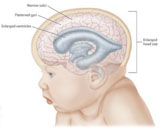Hydrocephalus (HC)

Hydrocephalus is a condition in which there is an abnormal accumulation of cerebrospinal fluid (CSF) within the brain. This typically causes increased pressure inside the skull. Older people may have headaches, double vision, poor balance, urinary incontinence, personality changes, or mental impairment. In babies there may be a rapid increase in head size. Other symptoms may include vomiting, sleepiness, seizures, and downward pointing of the eyes. Hydrocephalus can occur due to birth defects or be acquired later in life. Associated birth defects include neural tube defects and those that result in aqueductal stenosis. Other causes include meningitis, brain tumors, traumatic brain injury, intraventricular hemorrhage, and subarachnoid hemorrhage.
Organism species: Mus musculus (Mouse)
- Disease model DSI687Mu01 Mouse Model for Hydrocephalus (HC) In Stock
- Customized Service n/a Tissue of Hydrocephalus (HC) (If Necessary) Tissue Customized Service Offer
- Customized Service n/a Serums of Hydrocephalus (HC) (If Necessary) Serums Customized Service Offer
Organism species: Rattus norvegicus (Rat)
- Disease model DSI687Ra01 Rat Model for Hydrocephalus (HC) In Stock
- Customized Service n/a Tissue of Hydrocephalus (HC) (If Necessary) Tissue Customized Service Offer
- Customized Service n/a Serums of Hydrocephalus (HC) (If Necessary) Serums Customized Service Offer
Organism species: Cavia (Guinea pig )
- Disease model DSI687Gu01 Cavia Model for Hydrocephalus (HC) In Stock
- Customized Service n/a Tissue of Hydrocephalus (HC) (If Necessary) Tissue Customized Service Offer
- Customized Service n/a Serums of Hydrocephalus (HC) (If Necessary) Serums Customized Service Offer
Organism species: Oryctolagus cuniculus (Rabbit)
- Disease model DSI687Rb01 Rabbit Model for Hydrocephalus (HC) In Stock
- Customized Service n/a Tissue of Hydrocephalus (HC) (If Necessary) Tissue Customized Service Offer
- Customized Service n/a Serums of Hydrocephalus (HC) (If Necessary) Serums Customized Service Offer
Organism species: Canis familiaris; Canine (Dog)
- Disease model DSI687Ca01 Canine Model for Hydrocephalus (HC) In Stock
- Customized Service n/a Tissue of Hydrocephalus (HC) (If Necessary) Tissue Customized Service Offer
- Customized Service n/a Serums of Hydrocephalus (HC) (If Necessary) Serums Customized Service Offer


